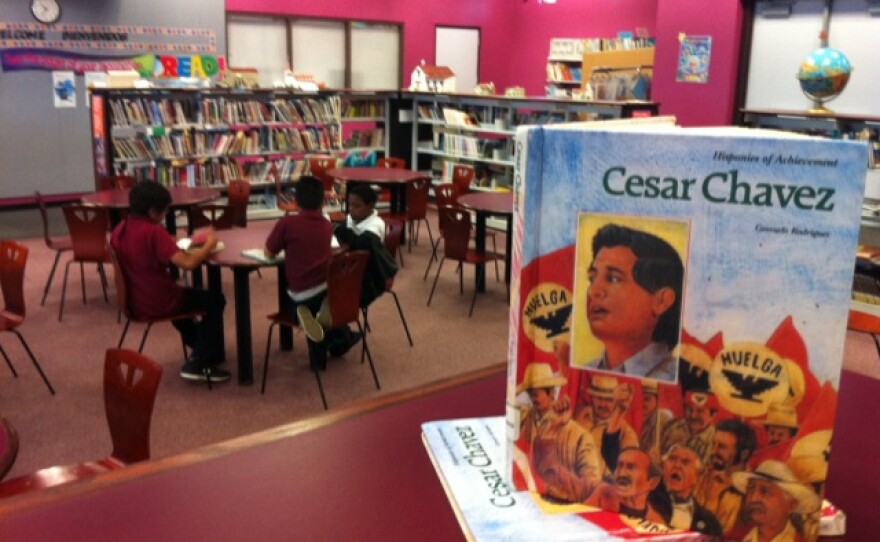Angie Connor is a 3rd grade teacher at Cesar Chavez Elementary School in San Diego.
Projected on her classroom wall is a large map of California. She points to yellow stars that dot the Central Valley. The stars represent the areas where Chavez had to go to pick crops.
Connor says even though the school is named after the famous labor leader, class instruction doesn’t focus on Chavez’s legacy until March – the month he was born.
Over the next week, Connor will introduce these youngsters to who Chavez was as a person and what he did for migrant workers.
Chavez was born in Yuma, Arizona. His family owned a grocery store and a ranch, but they lost everything during the Great Depression.
The family then moved to California to become migrant farm workers.
Chavez would pick corn and grapes in the summer, peas and lettuce in the winter.
Working conditions were poor and unsafe. They didn’t have clean water or toilets. Wages were meager, just pennies a day.
The soft-spoken Chavez changed all that by forming the United Farm Workers union.
Some public school teachers approach this labor movement just like any other history topic.
But for Connor, it’s personal.
Connor’s father was a migrant worker.
“Growing up I heard my dad tell stories about the things they experienced. How they had to roll up their bedding and go place-to-place. Hearing that and seeing his reaction when he would cry, I would feel that sense of sorrow,” Connor recalls.
But teachers say those feelings are lost on students who are far removed from the civil rights generation.
She does this by splitting them into two groups – one gets to do art activities and has more play time. The other group has to sit inside and complete worksheets. Then they switch.
“Human rights and justice are both huge words for the third graders, so it’s something they have to experience individually or as a group until they feel it intrinsically -- they can’t get a really good feel for what it’s like to feel inadequate,” says Connor.
Agustin Orozco, assistant director at UC San Diego’s Office of Academic Support and Instructional Services, says even college students don't realize the privileges they enjoy are because of hard fought battles led by people like Chavez.
Orozco says Chavez’s teachings are even more poignant today as education, immigration and unions are under attack.
“It’s not so far back in history, and if you drive down the freeway, you still see people picking crops. So there are a lot of things that are still similar to those times.”
Conner, the third grade teacher at Chavez Elementary, says she’s doing her part to education the next generation.
She likes to read a vibrantly colored picture book called Harvesting Hope.
It takes kids on a journey through Chavez’s life – from a school boy to civil rights leader.
She points to one of the pages which depicts Cesar as a young boy with a sign around his neck that reads, “I am a clown, I speak Spanish.”
“This is a page that reminds me of my dad because my dad spoke of this -- that breaks my heart,” says Connor.
Connor’s efforts are beginning to make a lasting impression.
Ten-year-old Jessie Rosete, a Chavez Elementary student, says if he met Cesar Chavez, he’d want to say thank you.
“He changed everything for the farm workers and they get better salaries now,” says Rosete. “I know he was a man of not a lot of words, but when he did say something it was straight to the point.”
Students at Chavez Elementary will mark Cesar Chavez Day with a march around the neighborhood.
This year they’ll be protesting teacher layoffs they say disproportionally affect Latino communities.






